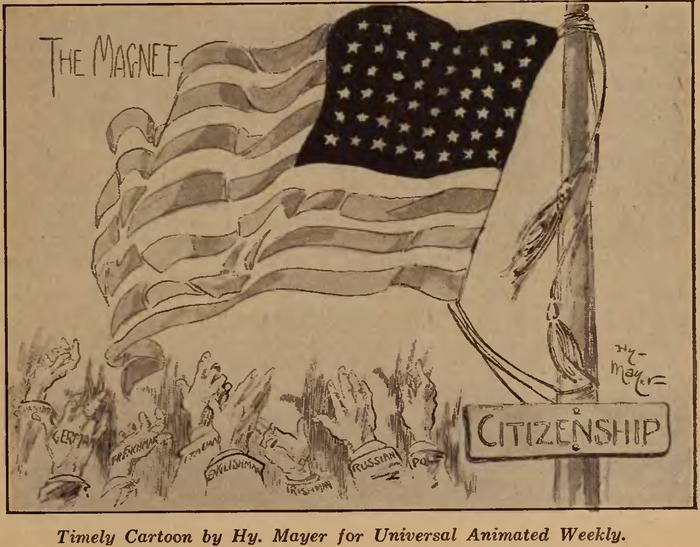From the moment immigrants set eyes on acquiring citizenship in their host country – especially when they accept it as a nationality of higher status – they already begin to identify with the particular nation. Furthermore, they simultaneously grow attachment to its culture as they distance themselves from their original one. These are the conclusions made by a Swiss research team after surveying 400 immigrants from Portugal, who either: (1) have already acquired Swiss citizenship; (2) wished to acquire Swiss citizenship; or (3) did not want to acquire Swiss citizenship. Their findings are published in the open-access scholarly journal Social Psychological Bulletin.

Credit: Moving Picture Weekly Pub. Co.
From the moment immigrants set eyes on acquiring citizenship in their host country – especially when they accept it as a nationality of higher status – they already begin to identify with the particular nation. Furthermore, they simultaneously grow attachment to its culture as they distance themselves from their original one. These are the conclusions made by a Swiss research team after surveying 400 immigrants from Portugal, who either: (1) have already acquired Swiss citizenship; (2) wished to acquire Swiss citizenship; or (3) did not want to acquire Swiss citizenship. Their findings are published in the open-access scholarly journal Social Psychological Bulletin.
People belong to particular social groups depending on their gender, ethnicity, profession, or nationality. Often these groups are perceived as having a specific social status within the society which affects evaluations of individuals in the group. For example, a Portuguese immigrant in Switzerland may be perceived as of lower status, because they belong to a group that is less valued than the host population. In addition, this low status is often combined with other features of low-status group memberships, such as having a profession that is poorly paid and of lower status in the context of employment.
On these lines, a research team from Switzerland decided to study how Portuguese immigrants in Switzerland negotiate between their multiple identities, in terms of their sentiments towards both their home and host culture. This depends on whether they have acquired Swiss citizenship or wish to acquire it. The team further explains that they were particularly interested in Portuguese immigrants, because they are currently the third-largest immigrant population in Geneva, and are also overrepresented in manual labour. Compared to other European immigrant groups in the country, they are also earning the lowest mean salary.
Amongst the major findings of the team was that it was not necessary for immigrants to have already acquired Swiss citizenship for them to identify as Swiss. Rather, it was “already the desire or wish to join a group that leads the individuals to ready themselves for joining the group through an increase in identification with the desired group”.
Curiously, things changed when it came to the immigrants identifying with Portuguese. Compared to both, the Portuguese who had already acquired Swiss citizenship and those who were not interested in applying for it, the immigrants who anticipated to qualify for citizenship showed the weakest attachment bond with their home country. According to the researchers, this phenomenon can be interpreted as a strategy of “assimilation to the host society” in the sense that the surveyed immigrants had a strong desire to make it clear for the community they wish to join, and, moreover, that it is their preferred one. However, as soon as they achieve it, they start to regrow more attachment to their original group.
As for the engagement and interest in cultural practices, results were similar to those concerning identity. Interest in Swiss practices is reported to increase when the immigrants desired to acquire Swiss citizenship or had actually become Swiss nationals. Meanwhile, their interest in Portuguese practices decreased.
While the scientists did not find an effect of citizenship and presumed social status on attitudes towards immigration in general, their findings suggest that immigrants who have become Swiss nationals or wished to become ones, were more unlikely to engage in collective actions with other Portuguese.
“Overall, these findings let us conclude that individuals psychologically manage their identities,”
says the team.
“They approach the high-status identity (Swiss nationality), when they wish to be part of it, or are already part of it. At the same time, immigrants seem to start distancing themselves from their original, and – in the host country – less valued identity, by showing lower levels of attachment, lower interest in cultural practices and support for other Portuguese in Switzerland.”
“Thus, these changes in identity management are not a consequence of officially becoming a citizen in the host country. Rather, they can be considered a sign of the psychological preparation to one day become a member of a higher valued group,”
the researchers conclude.
Original source:
Chipeaux, M., Kulich, C., Iacoviello, V., Politi, E., & Lorenzi-Cioldi, F. (2024). Anticipated and Achieved Individual Mobility Amongst Portuguese Immigrants in Switzerland: Social Identity Adjustment and Inter-Minority Relations. Social Psychological Bulletin, 19, 1-25.
Journal
Social Psychological Bulletin
Article Title
Anticipated and Achieved Individual Mobility Amongst Portuguese Immigrants in Switzerland: Social Identity Adjustment and Inter-Minority Relations
Article Publication Date
20-Mar-2024



